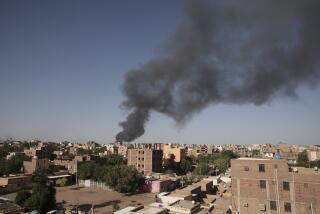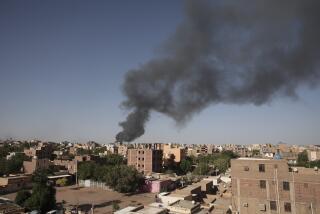Hold Firm on Somalia Withdrawal
- Share via
All is not calm in Somalia. Heavy fighting, the worst since U.S. troops embarked on this urgent humanitarian mission, threatens to delay peace talks slated to start March 15, according to U.N. officials. Those talks must take place as scheduled because the negotiations hold out the best promise for a political solution to the factional fighting that has destroyed much of this Horn of Africa nation.
The fierce combat, which started Thursday after two days of anti-American rioting in Mogadishu, has already set back the withdrawal of about 3,000 U.S. troops. The temporary delay is understandable because of the recently intensified conflict between the allied troops and loyalists of Somali warlords. But that fighting must not be used as an excuse by the United Nations to entrench Americans in Somalia.
U.N. Secretary General Boutros Boutros-Ghali has dithered while trying to push the United States to do more than guarantee safe passage for relief supplies intended for malnourished men, women and children. Keeping that humanitarian aid out of the hands of armed Somali thugs is all that Presidents Bush and Clinton promised. But Boutros-Ghali has made no secret of his desire to see the Americans destroy heavy weaponry and empty the huge arsenals before turning security over to U.N. peacekeeping troops. The United States cannot police the world. That is a role better suited for international troops under U.N. leadership.
U.S. military leaders want out by April or May. Because U.N. operations are notoriously slow--witness the initial snail-like response to the Somali crisis--the United States could continue the command until June. But meeting even that delayed timetable requires action at once.
Boutros-Ghali should outline now when the transfer of command will take place. In preparation for that transfer, the United Nations must also prove its neutrality to wary Somali factions and eliminate concern that the world body might be biased toward any particular warlord.
Boutros-Ghali, who was pelted with rotten fruit when he visited Somalia, must also rebuild respect for the U.N. peacekeepers. The Pakistani troops who arrived in October under U.N. auspices were vastly outmatched in numbers and arms. Those 500 soldiers were restricted to the airport. Despite their presence, the runways remained closed, even though relief agencies needed the facility to get in food and medicine. In order to really make a difference, there must be more U.N. peacekeepers--closer to the 33,000 figure reflecting the total of U.S. and other troops now assigned to Somalia under other auspices.
The United Nations should also make every effort to encourage Somalia’s many leaders to agree on an interim government. A timely diplomatic solution would allow Americans to leave by summer without getting bogged down in the conflict, and without consigning Somali children to more starvation and murder.
More to Read
Sign up for Essential California
The most important California stories and recommendations in your inbox every morning.
You may occasionally receive promotional content from the Los Angeles Times.













